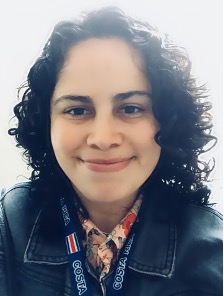
Hello! Our names are Onyinyechukwu Onwuka du Bruyn, Brianna Hooks Singletary, and Grettel Arias Orozco from Nigeria, the United States of America, and Costa Rica, respectively. We are doctoral students in the UNC Greensboro Educational Research Methodology department specializing in Program Evaluation. We are members of the STEM Program Evaluation Lab (SPEL) under the tutelage of Drs. Ayesha Boyce, Aileen Reid, and Tiffany Tovey. SPEL is a diverse and collaborative lab that meets weekly and we work on various STEM-related evaluation projects while attending to issues of equity, diversity, and inclusion (EDI). As graduate students in the lab, our role is to assist with the evaluation of STEM education grants and mentor undergraduate research assistants to aid in their research and evaluation experience.

We would like to share our thoughts on mentoring undergraduate students with a focus on 1) relationship building, 2) communication, and 3) capacity building.
Relationship Building: In SPEL, when working with undergraduate students we learned the importance of building relationships and trust between graduate mentors and undergraduate students. A relationship built on trust, openness, and understanding allows for both the mentor and mentee to feel comfortable when working with one another. Confidentiality between mentor-mentee plays a relevant role in helping mentees express their concerns and doubts.

Communication: Effective communication is an essential part of SPEL and critical in fostering a strong and effective mentor-mentee relationship. As graduate students and mentors, we understand the importance of effective communication because it is the foundation upon which relationships grow and creates avenues for good working conditions. As graduate mentors, it is important that we pay attention to verbal and non-verbal cues of our mentees to ensure that the two-way process of communication is not hindered. In addition, we ask clarifying questions and maintain the confidentiality of information shared by mentees to gain the trust needed for effective communication.
Capacity Building: During our time in the SPEL mentoring undergraduate students, we have come to understand that by mentoring this group of students we have had the opportunity to learn new things, expand and re-learn previous knowledge on topics such as writing a professional report, building a chart/table, running statistical procedures using different kinds of software, interpreting results, and building an understanding of what our findings mean for our clients, stakeholders and the general populations these programs aim to serve. In this sense, capacity building has been reciprocal. As graduate mentors, it is important that we are willing to learn from our undergraduate colleagues as it helps obtain mutual trust and further build relationships.
Hot Tips:
- Build trust, rapport and positive connections with your mentees.
- As a mentor, prove to be dependable.
- Never assume. Communicate with your mentees and ask clarifying questions.
- Let mentees be independent while providing constant support and guidance.
- Let mentees understand and discover what their limits and strengths are.
- Be a teacher and be teachable. Learning from your mentees is essential for a positive mentor-mentee relationship.
Rad Resources:
- Mentoring Resources
- The Science of Effective Mentorship in STEMM
- Inclusive Mentoring
- Mentoring the Mentors
- Mentoring Students of Color
The American Evaluation Association is hosting STEM Program Evaluation Lab Week. The contributions all this week to aea365 come from evaluators working in this lab. Do you have questions, concerns, kudos, or content to extend this aea365 contribution? Please add them in the comments section for this post on the aea365 webpage so that we may enrich our community of practice. Would you like to submit an aea365 Tip? Please send a note of interest to aea365@eval.org. aea365 is sponsored by the American Evaluation Association and provides a Tip-a-Day by and for evaluators. The views and opinions expressed on the AEA365 blog are solely those of the original authors and other contributors. These views and opinions do not necessarily represent those of the American Evaluation Association, and/or any/all contributors to this site.
